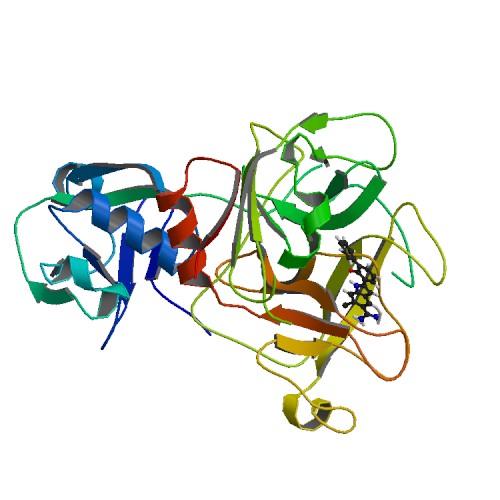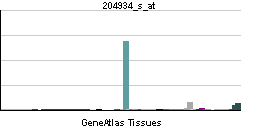HPN (gene)
| Hepsin (transmembrane protease, serine 1) | |||||||||||||
|---|---|---|---|---|---|---|---|---|---|---|---|---|---|
 PDB rendering based on 1o5e. | |||||||||||||
| |||||||||||||
| Identifiers | |||||||||||||
| Symbols | HPN ; TMPRSS1 | ||||||||||||
| External IDs | Template:OMIM5 Template:MGI HomoloGene: 20498 | ||||||||||||
| |||||||||||||
| RNA expression pattern | |||||||||||||
 | |||||||||||||
| More reference expression data | |||||||||||||
| Orthologs | |||||||||||||
| Template:GNF Ortholog box | |||||||||||||
| Species | Human | Mouse | |||||||||||
| Entrez | n/a | n/a | |||||||||||
| Ensembl | n/a | n/a | |||||||||||
| UniProt | n/a | n/a | |||||||||||
| RefSeq (mRNA) | n/a | n/a | |||||||||||
| RefSeq (protein) | n/a | n/a | |||||||||||
| Location (UCSC) | n/a | n/a | |||||||||||
| PubMed search | n/a | n/a | |||||||||||
Hepsin (transmembrane protease, serine 1), also known as HPN, is a human gene.[1]
Hepsin is a cell surface serine protease.[supplied by OMIM][1]
References
Further reading
- Wu Q (2001). "Gene targeting in hemostasis. Hepsin". Front. Biosci. 6: D192–200. PMID 11171558.
- Tsuji A, Torres-Rosado A, Arai T; et al. (1991). "Hepsin, a cell membrane-associated protease. Characterization, tissue distribution, and gene localization". J. Biol. Chem. 266 (25): 16948–53. PMID 1885621.
- Leytus SP, Loeb KR, Hagen FS; et al. (1988). "A novel trypsin-like serine protease (hepsin) with a putative transmembrane domain expressed by human liver and hepatoma cells". Biochemistry. 27 (3): 1067–74. PMID 2835076.
- Kazama Y, Hamamoto T, Foster DC, Kisiel W (1995). "Hepsin, a putative membrane-associated serine protease, activates human factor VII and initiates a pathway of blood coagulation on the cell surface leading to thrombin formation". J. Biol. Chem. 270 (1): 66–72. PMID 7814421.
- Torres-Rosado A, O'Shea KS, Tsuji A; et al. (1993). "Hepsin, a putative cell-surface serine protease, is required for mammalian cell growth". Proc. Natl. Acad. Sci. U.S.A. 90 (15): 7181–5. PMID 8346233.
- Strausberg RL, Feingold EA, Grouse LH; et al. (2003). "Generation and initial analysis of more than 15,000 full-length human and mouse cDNA sequences". Proc. Natl. Acad. Sci. U.S.A. 99 (26): 16899–903. doi:10.1073/pnas.242603899. PMID 12477932.
- Chen Z, Fan Z, McNeal JE; et al. (2003). "Hepsin and maspin are inversely expressed in laser capture microdissectioned prostate cancer". J. Urol. 169 (4): 1316–9. doi:10.1097/01.ju.0000050648.40164.0d. PMID 12629351.
- Somoza JR, Ho JD, Luong C; et al. (2004). "The structure of the extracellular region of human hepsin reveals a serine protease domain and a novel scavenger receptor cysteine-rich (SRCR) domain". Structure. 11 (9): 1123–31. PMID 12962630.
- Ota T, Suzuki Y, Nishikawa T; et al. (2004). "Complete sequencing and characterization of 21,243 full-length human cDNAs". Nat. Genet. 36 (1): 40–5. doi:10.1038/ng1285. PMID 14702039.
- Gerhard DS, Wagner L, Feingold EA; et al. (2004). "The status, quality, and expansion of the NIH full-length cDNA project: the Mammalian Gene Collection (MGC)". Genome Res. 14 (10B): 2121–7. doi:10.1101/gr.2596504. PMID 15489334.
- Kirchhofer D, Peek M, Lipari MT; et al. (2005). "Hepsin activates pro-hepatocyte growth factor and is inhibited by hepatocyte growth factor activator inhibitor-1B (HAI-1B) and HAI-2". FEBS Lett. 579 (9): 1945–50. doi:10.1016/j.febslet.2005.01.085. PMID 15792801.
- Pal P, Xi H, Kaushal R; et al. (2007). "Variants in the HEPSIN gene are associated with prostate cancer in men of European origin". Hum. Genet. 120 (2): 187–92. doi:10.1007/s00439-006-0204-3. PMID 16783571.
- Moran P, Li W, Fan B; et al. (2006). "Pro-urokinase-type plasminogen activator is a substrate for hepsin". J. Biol. Chem. 281 (41): 30439–46. doi:10.1074/jbc.M605440200. PMID 16908524.
- Betsunoh H, Mukai S, Akiyama Y; et al. (2007). "Clinical relevance of hepsin and hepatocyte growth factor activator inhibitor type 2 expression in renal cell carcinoma". Cancer Sci. 98 (4): 491–8. doi:10.1111/j.1349-7006.2007.00412.x. PMID 17309599.
| This protein-related article is a stub. You can help Wikipedia by expanding it. |